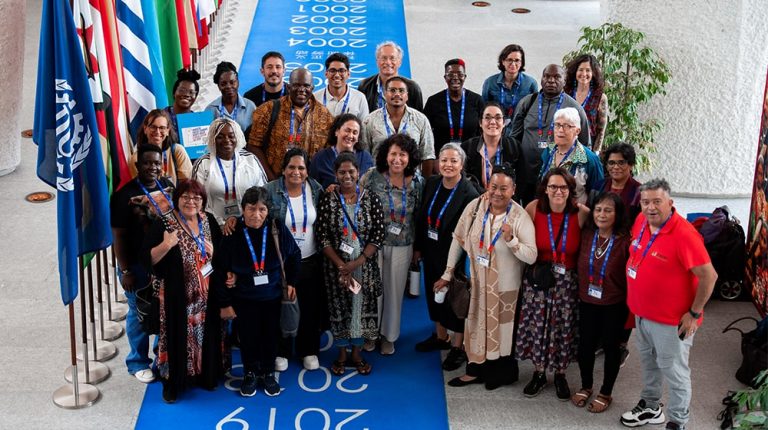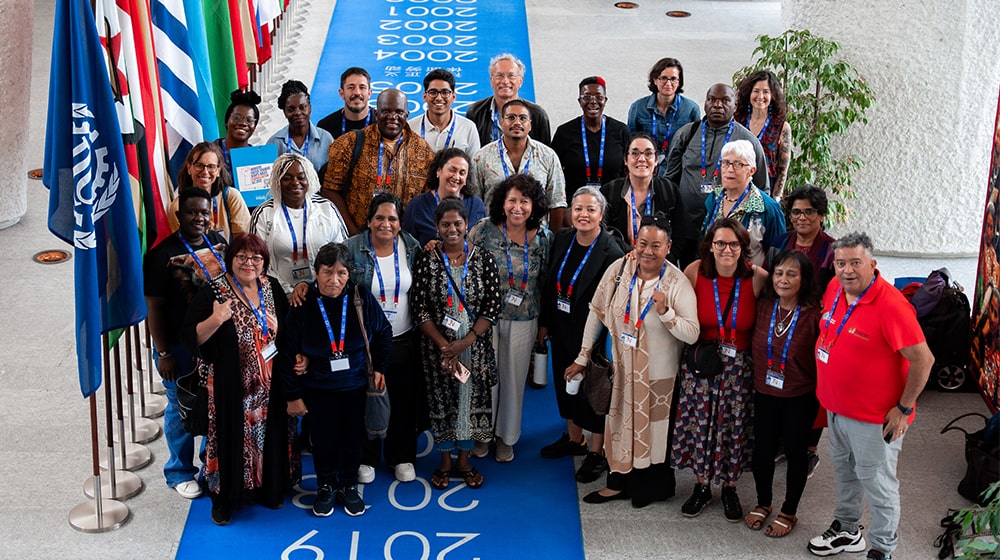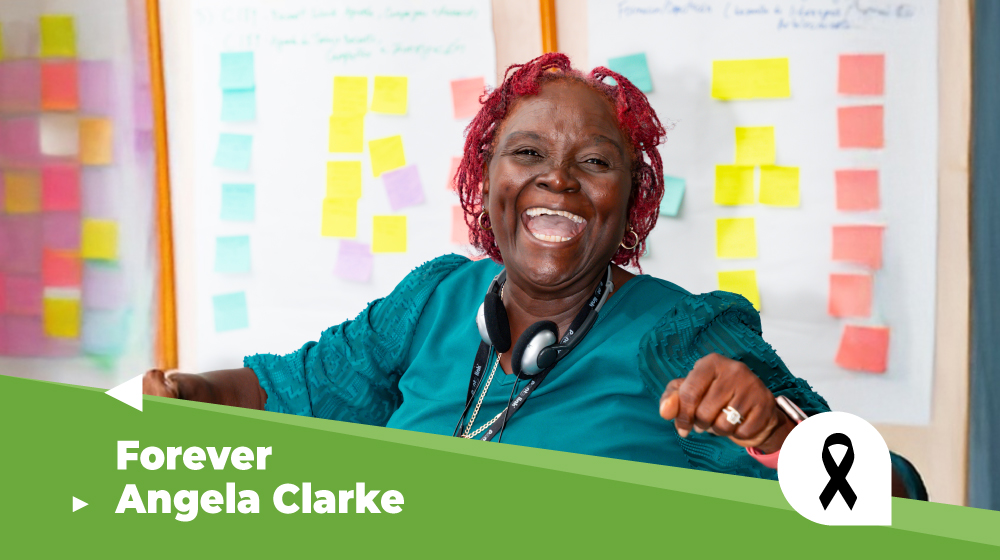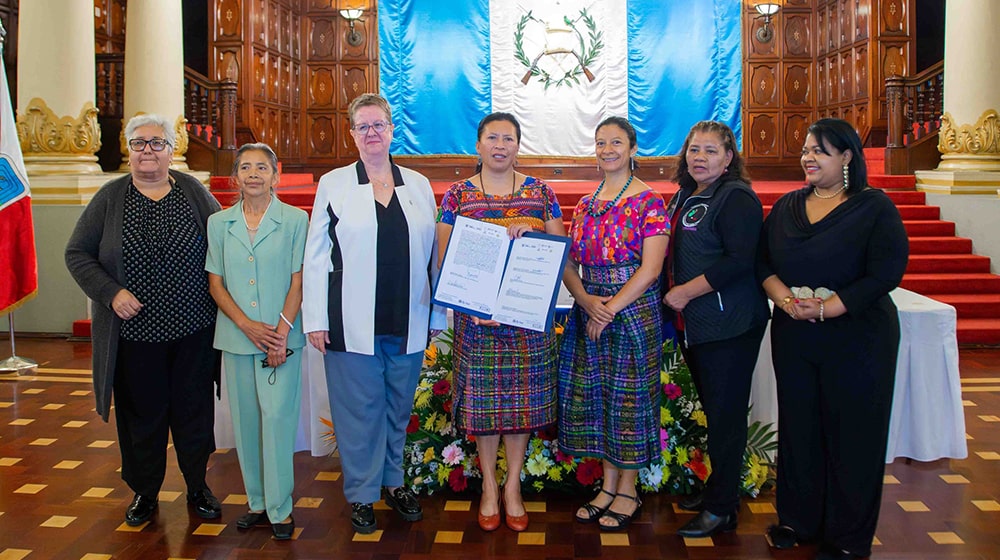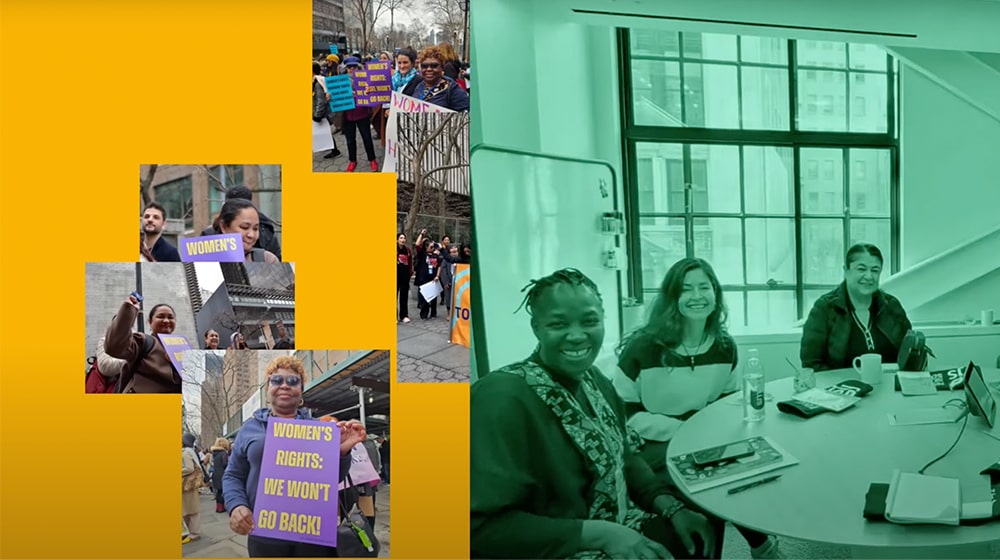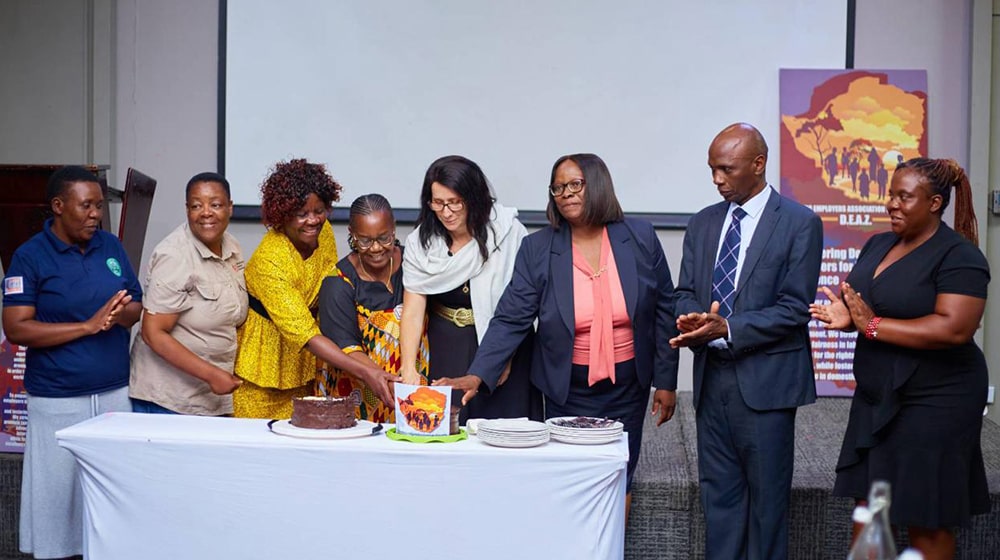Today, November 13, 2024, we must bid farewell with great sorrow to our beloved Adelinda Díaz Uriarte, a historic leader of domestic workers in Peru and throughout Latin America. If we had to describe her in a single sentence, we could say, “A lifetime dedicated to domestic workers,” but that handful of words does not do her justice. We would need many more to honor her as the leader of FENTRAHOGARP for the legacy she left us with her example of commitment and sacrifice, her faith and resilient spirit, her tireless activism, and her compassionate heart. Retracing her remarkable life story is one way to pay tribute to her and immortalize her in our hearts. Adelinda will forever inspire those of us who fight for a future where dignity and decent work are a reality for all domestic workers around the world.
A Life of Sacrifice and Resilience
Adelinda Díaz Uriarte was born on March 8, 1946, in a village in the Chota province, Cajamarca department, into a family of eight children, with a mother who was a weaver and a father who was a farmer. Despite being born prematurely at only seven months gestation, with little weight and much weakness, in a time when most premature babies didn’t survive, Adelinda won her first battle.
“I was born to live, no matter how difficult it was, even when life denied me the minimum favorable conditions.”
She attended school until second grade at a rural institution, surrounded by boys. These were times when schooling was not common for girls. But the early death of her mother changed the course of this brilliant student’s life, forcing her to abandon her studies and care for her three younger siblings until she was 14. It was then, in her adolescence, when she was offered a job in Lima and the opportunity to return to school. With the hope of a better future, her father legally gave custody of Adelinda to a family from the exclusive Miraflores neighborhood. It marked the beginning of a ten-year ordeal.
The resting place assigned to her by her employers was undignified. She endured cold and hunger. She only had a service uniform and an apron to go to school. She worked barefoot, wanting to preserve her only pair of shoes for class. For four years, she cooked, washed, and cleaned for a family of fifteen, in addition to caring for a 90-year-old woman. She worked fourteen hours a day without pay and had no weekly time off. She only saw the street to go to and from school, walking with her last breath and an empty stomach, so thin she was anemic. They didn’t even allow her to communicate with her father: they destroyed her letters, making her believe that even her own family didn’t care for her.
“They discriminated against me because of the color of my skin. They called me ‘chola’ or ‘serrana’ in a derogatory way. In my heart, the weight of a giant rock settled: it hurt to be a migrant, an orphan, and poor.”
The document her father had made her employers sign, in which they promised not to interrupt her studies, was the only light of hope for the teenager who knew that once she turned 18, she would finally stop being a slave and would have an education capable of opening new doors. Through the religious school of Fátima, Adelinda made contact with the Christian Worker Youth and learned about her rights as a worker. It was then that she discovered that there were many other girls in the same situation, and she began to nurture the idea of organizing them. She finished primary school with outstanding grades and a newly born dream.
But years of mistreatment, hardship, and humiliation still lay ahead. As a young woman, in addition to the labor exploitation Adelinda was already suffering, she was sexually harassed by her employer’s son. That’s why, as soon as she turned 18, she fled that prison with empty hands, not even allowed to take her Bible. For three days, she wandered the streets of Miraflores, drinking from the fountains in the public squares to quench her thirst and sleeping under trees, until a schoolmate secretly took her in at the house where she worked. During the day, when the family was away, Adelinda helped her friend with the household chores. At night, she hid under her friend’s bed to avoid being discovered.
With her second and third jobs, she had no better luck: wealthy families with prestigious surnames who offered her a shabby roof and scarce food in exchange for endless hours of hard labor. Salary? A “privilege” she still hadn’t experienced. In 1970, she found the first job where she was paid a salary and treated with dignity. In that house, Adelinda was able to finish high school and gain the momentum she needed to dive into union activism.
Under the mentorship and spiritual guidance of Father Carlos Álvarez Calderón, that shy girl, but with overwhelming potential, transformed into an emerging leader. The priest pushed her into her baptism by fire: speaking about labor rights in front of five hundred domestic workers. That was a turning point in her personal life and union militancy.
“I’ll never forget what the Father told me at that moment, as I resisted, on the verge of tears: ‘Today, you are crying not to speak; later, you will cry much more, but you will never stop speaking.’ That’s when I discovered that my mission was to stop crying about my misfortune, the abuse, and discrimination I had to endure. I discovered that it was all part of my learning to fight for the rights of many other women who suffered as much or more than I did.”
The Dream of Organizing Becomes a Reality
In 1971, with the support of her other mentor, Father Alejandro Cusianovich, Adelinda decided to take the big leap, convinced that domestic workers had the same rights as any other worker, that they needed to organize, and that they had the strength to do so. She then gathered twenty colleagues from different Christian communities interested in learning about union organization, with whom she began an arduous task that culminated in 1973 with the formation of eight district associations, coordinated under the Domestic Workers’ Union Coordinator of Metropolitan Lima.
The reaction from employers to the first leaflets distributed by those pioneers was swift. They immediately published outrageous ads in the country’s leading newspapers: “The maids have organized. They’re asking for a bow tie, color TV, rugs, and as a bonus, my husband.” And although many of them were fired, not only did they not back down, but they raised the stakes. “The struggle was titanic: never before had the country’s most undervalued women for the type of work we did rebelled and raised our voices so much,” Adelinda recalled.
In 1976, they expanded the Coordinator’s reach nationwide, but the brutal military dictatorship of the time fought union militancy and persecuted its leaders. The organization founded by Adelinda was able to reactivate itself six years later, with the return of democracy, but it still had not achieved formal recognition by the state. As a clever alternative to continue advocating for the rights of the sector, our leader founded the Domestic Workers’ Training Center (CCTH), which could not be denied legal status.
In 1993, recognizing the need for visibility and communication, Adelinda created the radio program “Sonco Warmi” (which means “heart of a woman” in Quechua), hosted by domestic workers themselves under the slogan “The voice of those who never had a voice.” With the arrival of the new millennium, the path began to smooth out: in 2006, our leader founded the National Union of Domestic Workers of Peru (SINTRAHOGARP), with nine branches across the country; and in 2013, she formed the National Federation of Domestic Workers of Peru (FENTRAHOGARP), which has eight affiliated unions and is part of the Central Unitaria de Trabajadores del Perú (CUT).
Under Adelinda’s leadership, these organizations embarked on a decade of tireless struggle and fierce advocacy with employers and governments, as well as countless support, assistance, counseling, and training initiatives aimed at domestic workers. The crowning achievement of this great work was the approval of the Domestic Workers’ Law in 2020, which equalized the labor rights of the sector with those of other workers (before this law, domestic workers enjoyed only half of the labor rights granted to other workers). A historic and unexpected achievement just a few years ago.
A Struggle that Goes Beyond Borders
In 1979, when there was still no international domestic workers’ organization, Adelinda was already advocating for the recognition of the sector’s rights before the United Nations in the United States. In 1983, she met with colleagues from other countries in the region at an event organized by feminist scholar Elsa Chaney, held by the Latin American Studies Association (LASA). It was there, alongside Adelinda Díaz Uriarte, Aída Moreno (Chile), and Yeny Hurtado (Colombia), that the idea of CONLACTRAHO began to take shape, which was formally founded in 1988 with ten affiliated organizations. Adelinda served as Secretary for Defense and Human Rights for two consecutive terms of intense activity that, together with the International Domestic Workers’ Network (now FITH), led to the adoption of ILO Convention 189 in 2011.
A Shower of Recognitions
Adelinda’s struggle also transcended the realm of domestic work, to the point that she was offered political positions and tempting benefits, which she rejected outright.
“I didn’t accept political positions because of my principles and dignity. It’s not easy being a leader: there are major contradictions of protagonism and divisions that prevent our organizations from moving forward. Many times I wanted to throw in the towel, but when I saw my colleagues mistreated, fired, harassed, and raped, I saw the mirror of what I went through, and that gave me the courage to keep going without giving up. My colleagues and the forgotten ones needed me more than politics did.”
Adelinda’s human integrity and her commitment to defending the rights of domestic workers, women, Indigenous people, migrants, and vulnerable people have earned her numerous national and international recognitions: from CEDAL, the Ministry of Women and Social Development, Flora Tristán, the General Confederation of Workers of Peru, the newspaper El Comercio, and the International Domestic Workers’ Network IDWN, among many others. She also received the U.S. “100 Heroines” award for her outstanding contribution to achieving women’s equality. However, the recognition that moved her most was the one awarded by the school in Chota where she began her primary education, which named her “godmother” to the new generations.
Pearls to Treasure
Adelinda Díaz Uriarte was also an enlightened and passionate speaker. It is worth recalling some of her most powerful statements:
- “I became a leader to make this society a place where women who do domestic and caregiving work stop being treated as non-humans, non-people, non-citizens.”
- “From my experience of slavery and denial of my rights, to my work for the respect of the human rights of women workers, I recognize myself immersed in a deeply political struggle that has not sought comfort, but a change in the living conditions, work, and citizenship in my country and the world.”
- “I have accumulated experience, I have shed the fear and loneliness that kept me immobilized during four years of my youth, imprisoned not by the four walls where they confined me, but by ignorance and the lack of knowledge that I had the right to have rights. Yet, sadness and helplessness still haunt me when I see, day after day, my story repeated in each of the domestic workers’ stories in my country.”
- “I have understood that my mission now goes beyond organizing women workers: today we need our voice to reach directly, clearly, and forcefully the power spaces where our destiny is defined. Because in the second decade of the 21st century, abuse, exploitation, mistreatment, and discrimination against women and men who work in service positions still cruelly persist.”
- “I gave my whole life with much care and love to defend domestic workers. I gave up forming a family and having children for what I love most: fighting to find justice. It is the only thing I have, and it is what I will take with me when I leave this planet.”
We will miss you dearly, Adelinda, but we know you will never disappear from this planet as long as you remain in our hearts. Thank you, warrior, for everything you have given us! Rest in peace in the Eternity that you so truly deserve.


